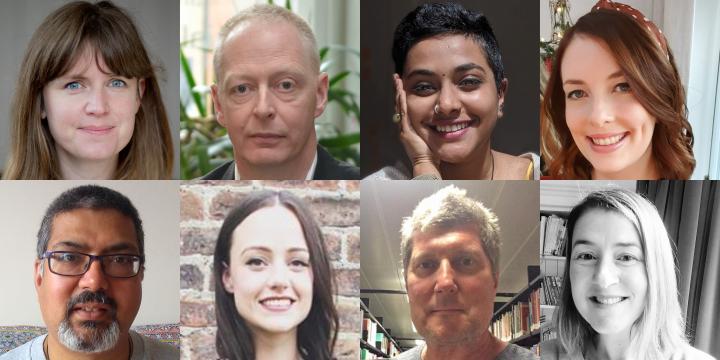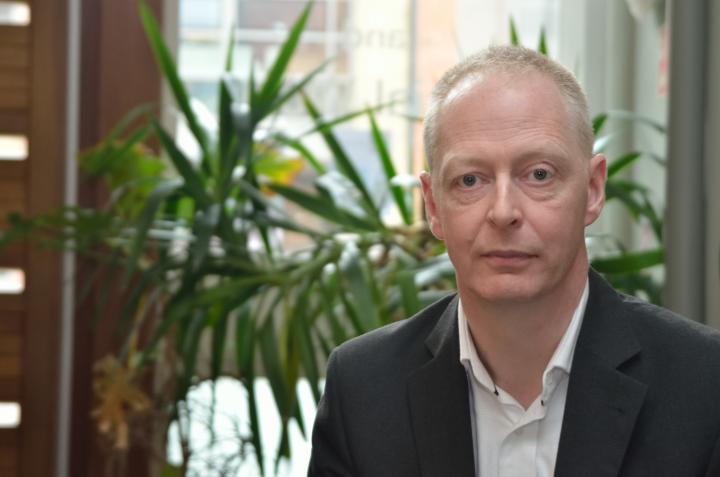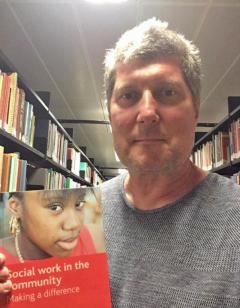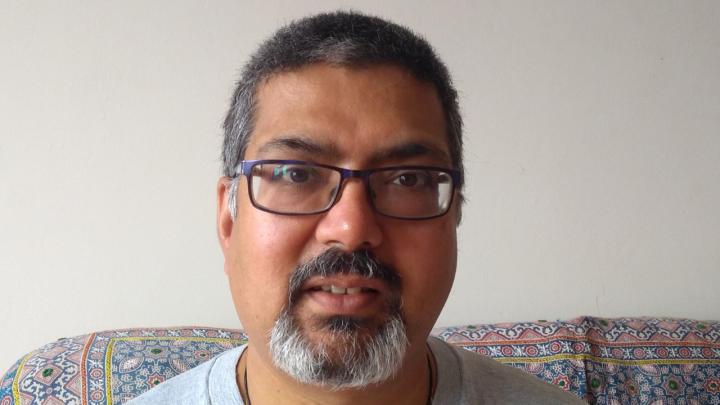A key role in the community
Meet the Edinburgh social workers who have been playing a vital part in keeping connected with people in need of support.

The public is used to celebrities and public figures making the headlines. However, the Covid-19 pandemic has brought with it a significant shift in how people perceive the ‘worth’ of jobs and professions we once took for granted. Increasingly, we are all acutely aware that it’s our key workers who prevent our society from collapsing.
Social workers may not wear an identifiable keyworker ‘uniform’ – and their roles may be complex and varied – but the need for them has never been more evident. Professor John Devaney, Centenary Professor and Head of Social Work at the University, puts the crucial role of social workers in the Covid-19 pandemic succinctly: “If social work wasn’t an existing profession it would need to be created.”

Each social work graduate is likely to work intensively with at least 2,000 individuals over their career, therefore the impact they have for both those individuals and society is significant Professor Devaney points out: “Social workers provide reassurance to the public that at a point of crisis for them or their loved one society is there to provide both emotional support and practical help – which may seem simple, but is in actuality a complex role.”
In our new post-Covid world, often it’s a social worker, working with limited resources, who prevents children, families and individuals from slipping through the cracks. Social work encourages social change and empowers people. It advocates the protection of human rights and promotes wellbeing for those in challenging situations. “Social work services are usually delivered in the living rooms of individuals, rather than in public buildings such as hospitals or schools, but the work is no less essential because of where it occurs,” explains Dr Autumn Roesch-Marsh, Director of the Master of Social Work programme at Edinburgh.

Qualified to cope in a crisis
The coronavirus pandemic and lockdown measures have placed particular pressure on vulnerable people. It’s a time for finding innovative ways to ensure those who need social workers don’t miss out at a time of crisis. We interview three recently qualified social workers from the University who graduated early, and two practising social workers gaining further qualifications at Edinburgh.

All five are now already working on the frontline of social work. We ask why they decided to become social workers and how the pandemic has affected their work. Many point to the importance of face-to-face contact in social work and the difficulties of replacing that with technology.
For Carol Duncan, an experienced children and families social worker for City of Edinburgh Council and a part-time doctoral student at the University, restrictions in such contact have posed a real challenge, because relationships are what make social work practice most effective. “Post-Covid, the vulnerabilities we were already aware of in a child’s situation have been magnified, while our ability to respond has been restricted,” she says. “Trying to get to know a child or parent you’ve never met before, in a time of crisis for them, has required a significant shift in how we work, but it’s also forced us to learn new habits and be creative.”
These concerns might relate to physical or mental health, alcohol or substance misuse, domestic abuse, poor housing or a lack of money for gas and electricity. For Carol, how this will play out in the longer term is a worry. “At the same time, some families have shown a real resilience in the face of the restrictions. This might be due in part to the element of shared experience in these strange and unusual times we’re now in. Children and parents also ask me how I’m doing, and we’ve joked about the cabin fever together or the shortage of toilet rolls,” she says. “I’m very aware though that we’ve encountered this crisis from very different positions of comfort and safety, and that for many of the children and families I work with this is yet another significant life challenge to add to the many they’ve already faced.”
Keeping in contact with children
Third sector organisations have come up with new ways of supporting children remotely. There are now online art groups and virtual drop-ins for teenagers. Schools have also been trying their best to reach all of their pupils. However, as Carol points out, some children have remained excluded from learning. “Digital poverty is a real issue,” she says. “Some children have had to share their mum’s mobile phone to do school work on. Even if a laptop or tablet is provided, access to Wi-Fi might not be, and not all parents have the confidence or capacity to support their children with the work they are being asked to do.”
Carol has found, in her day-to-day work, that already vulnerable families are now being kept apart for long periods. Covid restrictions imposed on supervising contact have meant some children looked after away from home haven’t seen their parents face-to-face for months. Also the shift, post-Covid, to online communication and paperless reports has had an impact on children and their parents participating meaningfully in case conferences and children’s hearings.
There have, however, been some benefits in online communication to learn from, for example the move to video calls has had some advantages for the children Carol talks to as part of her job: “Virtual participation seems to feel less overwhelming and intimidating for some children and young people particularly in larger meetings. They no longer have to travel to these meetings and can choose how they want to participate, switching their camera off when speaking, for example. It will be interesting to see what new approaches are retained when the threat of the virus is finally over.”
Asked why role of the social worker was important to her, both on a societal and personal level, Carol replies: “When you are working with children and families who face disadvantage on multiple fronts you want things to be better for them. Their struggles, so often without any of the financial, emotional and social support many of us take for granted, can be relentless. I’d challenge anyone in that situation not to feel worn down by it. Inequality and austerity has exacerbated these issues. People make mistakes and end up in really difficult situations but they should be treated with the same compassion and respect you’d want to be shown yourself. By doing that I hope when difficulties arise there will be a bit of trust that I’m there to help.”

There for vulnerable families
April Limerick, is a few weeks into her new job after graduating early from Edinburgh: She left school at age 16 and didn’t have the traditional journey from high school to university.
“I went back into education in my early 20s to study psychology as this was always something I was interested in,” she says. “I applied for the Social Work masters programme one Sunday in January thinking that I would never even get in. It wasn’t until I was writing the personal statement so effortlessly that I knew this was the direction for me and the very first day of classes only clarified this.”
The issues April now deals with include domestic abuse and drug abuse. She stresses that her role as a Children and Families Social Worker for Fife County Council is to work WITH the family to keep the family together. April admits that social work with children and families can be a difficult job to “switch off from”.
“Sometimes I find myself thinking about the kids at night,” she says. “The coronavirus pandemic has affected social work in so many ways. Social workers are currently relying heavily on technology (if it works) to carry out meetings and reviews etc. We’re lucky we’re able to do this so children and families still feel supported. However, social work is essentially a face-to-face profession and most of the work is carried out having face-to-face contact and conversations. Sometimes, when I’m wearing a mask, the client can’t see if I’m smiling – you just have to reach through your eyes.”
Helping people to carrying on living at home
Alumnus Matthew Eastwood’s role is to case manage and to try advocating for, organising and facilitating care packages for those struggling to remain at home after a sudden incapacitating illness such as a stroke, or the progressive impact of diseases such as Alzheimer’s or dementia. He describes a typical case he is dealing with a few weeks after qualifying: “A man who lives alone has just suffered a severely debilitating stroke. He has just come out of hospital and is now in a wheelchair. He can no longer work. For him, Day One at home is the new normal.” Mathew’s role is to facilitate “everything that happens” to try and ensure that the man, who dearly wants to stay at home, can do so – and that he can still live and function.

“I want to make sure he can still have a dignified and comfortable life,” says Matthew. To this end, he has organised occupational therapy and physiotherapy services, and 39 hours of drop-in care a week – in 15-minute two-carer sessions. The carers – a constantly rotating team of different people – pop in for these brief sessions during the night as well as during the day. The aim, as he puts it, is to prevent his client from ‘guardianship’ – having to go into a care home. Matthew points out that, on top of this care package, paid for by the local authority, it is only because the man’s adult children are willing, and close enough to do his food shopping for him, that staying at home is possible.
Asked how his job will be affected by Covid-19, he replies: “Massively. I believe society will change the way it works with a diverse range of technology being used for basic communication and meetings to reduce costs. There will likely be reduced numbers of key workers as governments and councils will be stretched financially when the world goes into recession. Vulnerable people in society are the least likely to be able to use technology and therefore could be further marginalised, and miss out on vital services. We need to find a way to minimise this by being creative and adaptable.”
Matthew started working in social care after many years doing voluntary work, initially completing a Youth Work degree in his 40s after a long unrelated career before his recent masters in Social Work. “While working as a volunteer and as a support worker alongside different social workers, I was impressed with the bigger picture work they carried out and the time they were able to find to make the right decisions,” he explains. “I worked in a special school and the time and space the senior social worker created for himself to think, and make good decisions, while surrounded by chaos impressed me. I wanted to learn that skill. The role as case manager is highly skilled and can make differences to society by managing risk – by finding the most effective solution to complex problems in a simple way. I learned long ago that I could not change the world. However, I could change the environment I live in.”
Tackling isolation and loneliness
New social work graduate, Lakshmi Ajay, has never doubted her decision to be a social worker, but like all new social work graduates she is entering a world of work where, as she puts it, “the entire system of the workplace has radically changed”.

Just a few weeks into her first job, as a health and social care social worker working with adults, Lakshmi is acutely aware of the post-Covid problems of increased isolation and loneliness. Lack of face-to-face human contact in lockdown has greatly increased the problems of people already suffering serious mental health issues. “Places that can help many people with mental health issues, such as day centres and churches, haven’t been open,” she says. “You can listen to church services online but many older people with mental health issues are not ‘tech savvy’. You can reach out to people online, but it’s not the same as a friendly hand on the arm.”
Face-to-face visits for those living at home with mental health issues are now only being carried out in the most extreme cases of need. “It’s only if it’s quite a high-risk case now, for example for someone who is likely to harm themselves or could harm others,” says Lakshmi.
“The more I went to my courses and my student placements, the more I became sure of this career path,” she continues. “As someone entering the workforce, the fact is that since my student placement, the entire system of the workplace has radically changed. Added to this is the fact that I will be part of a new team, a new setting, new managers and working with a relatively different service user group. The difficulty of getting appropriate guidance and peer support at this crucial point in my career is an issue that I will find ways to overcome eventually, I’m sure.”
Lakshmi feels her studies at the University have equipped her for the challenges ahead, as she explains: “I’ve had a very encouraging personal tutor who has been extremely helpful in my dealing with the stresses of workplace environments and is available for guidance for a few more months. In addition, my personal tutor’s experience as a frontline worker combined with her academic sensibilities makes her quite experienced in providing appropriate guidance too.”
Lakshmi took a film degree before starting her masters in Social Work. A peek into other industries made her aware of the increasing impact that austerity, commercialisation and extreme capitalism had on certain sections of our society: “It made me realise that I wanted to pursue a career that was meaningful to people besides myself.”

Focusing on mental health
Roisin Hickey, an experienced social worker, has been studying at Edinburgh for advanced practice in her field of mental health – but as the Covid-19 pandemic reached the UK her programme, like that of many others, was paused as she reached her final placement for the mental health officer qualification.
“I returned to my social work role within a mental health and substance misuse team and was happy to rejoin my colleagues during this unprecedented time,” Roisin explains. “My work has been affected as I am now working from home and there are restrictions on the home visits we can do. Most of my contact with the people I work with is now over the telephone. This presents some challenges as you are more dependent on what the person tells you as you can’t see their home environment or non-verbal cues such as body language, I don’t think I had appreciated how much these additional factors contribute to assessments.”
However, Roisin has noticed that having more contact via telephone has allowed for more frequent contact with people: “During the current pandemic I think people appreciate, more than ever, connection with others and a chance to talk about how they are feeling. I think that this pandemic initially has demonstrated some people’s resilience. However, the longer this situation continues I think the impact on people’s mental health will become more visible and social work will play a key role in addressing and supporting this.”
Finding ways to keep motivated
For Roisin, updates from her University programme coordinators have been useful, as these included information about changes in legislation and current practice due to Covid-19. For Matthew too, his programme has been a key factor in coping with the new demands. “I’ve been fortunate to have worked with some highly skilled and passionate lecturers, senior management and students while studying,” he says. “Their practical skills as well as academic prowess have helped form my practice. They have taught me the benefit of collective working and using shared resources, as well as the importance of individual decision-making. I leave University with a better understanding of the role of social work and my future roles, and a knowledge that I should always collaborate with others where possible. The way that the University, in my experience, adapted to the challenges of Covid-19 showed a resourcefulness and adaptability that was admirable.”
So what – as well as support from training, and support from their peers – keeps someone working as a social worker against all the odds? An intense focus on the person who urgently needs their help, and a strong sense of vocation, was clear in all five of the Edinburgh social workers we spoke to. Carol Duncan’s experience and dedication is typical – she has always had an interest in working with children. “While studying for my undergraduate degree I volunteered with the university charity, Children’s Holiday Venture,” she says. “We used to drive the minibus around Craigmillar on a Monday night picking kids up to take them swimming. Week on week you’d try to manage the chaos in the pool while having 10-year-olds dive bomb on you. The kids were quick-witted and fun to be around but the contrast between where they lived, at that time one of the most deprived areas of Scotland, and the privilege of my university life was stark.”
She continues, “From these inauspicious beginnings at Leith Waterworld I ended up working on and off for around 10 years in children and young people’s residential units in Edinburgh, before returning to the University to do my masters in Social Work. It’s definitely been the right career choice for me.”
Clearly, a sense of humour is also key. Asked if she ever doubted her decision to be a social worker, Carol replies: “The money and prestige make it all worthwhile. On a serious note, the negative perception of social work frequently seen in the media can be frustrating. And you can’t escape the emotional impact or the heavy workload of the job at times. But, apart from that, and a few Leith Waterworld near-drowning moments, no.”

With such commitment and dedication shown by these social workers, along with many others around the UK, and the world, now is the time to fully appreciate the value to society of the essential roles they carry out. For Dr Sumeet Jain, Director of the BSc Social Work programme, the statistics speak for themselves. “Research and satisfaction surveys indicate that individuals who have been in receipt of social work services often rate the experience highly,” he says. “They feel valued, listened to and understood, and their needs are often attended to in ways which help them to feel less isolated, supported to deal with the challenges in their life, and often to feel safer.”
Find out more
The University started providing training for social workers in 1918 and we are well-recognised as a leading institution in social work training. Based in the School of Social and Political Science, Social Work at Edinburgh has been ranked number one in the UK for the third year in a row in the recent Complete University Guide 2021 league table.
About the writer
Alumna Dr Aileen Ballantyne, PhD Creative Writing and Modern Poetry (2014), is the former Medical Correspondent for the Sunday Times and the Guardian. She has twice been commended in the British Press Awards. Her first full poetry collection published by Luath Press, Taking Flight, ‘a journey through time and place, from the 1969 Moon Landings to the Lockerbie disaster and beyond’ includes a series of poems on the personal stories of those involved in the Lockerbie disaster.

